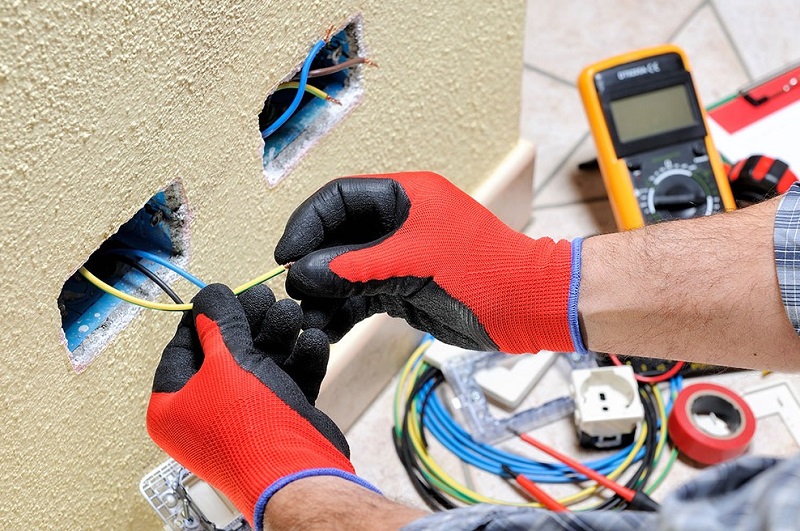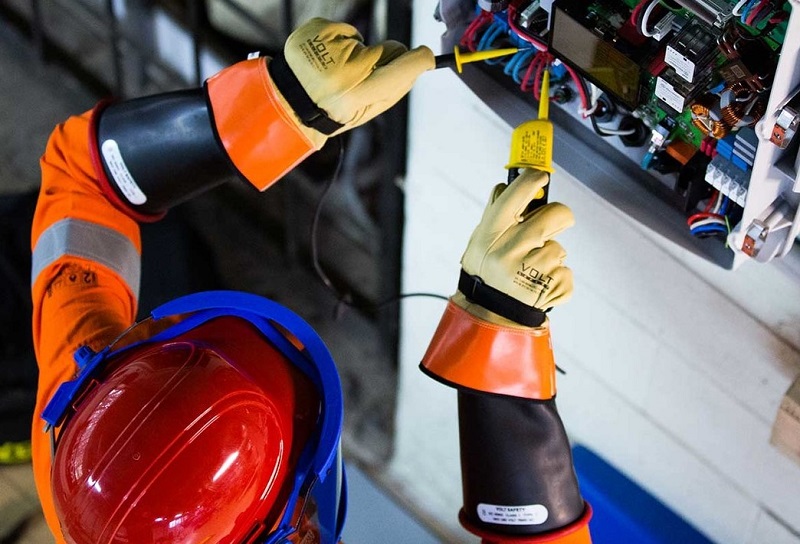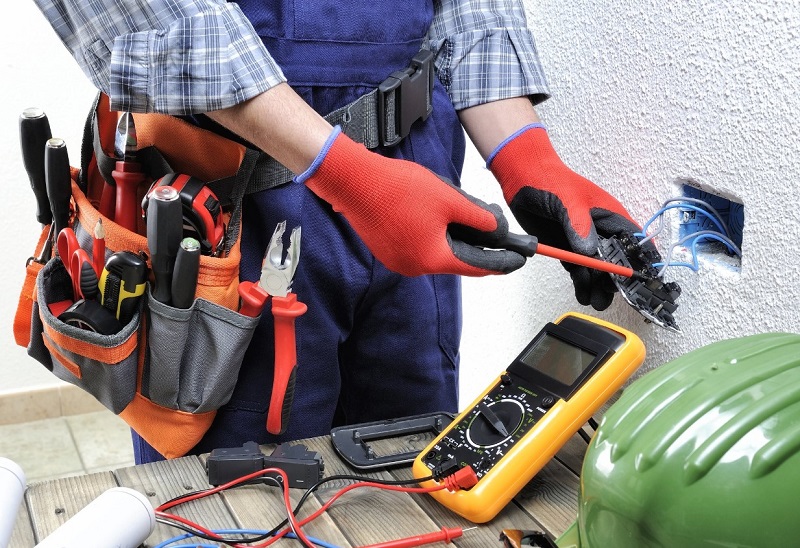As an electrician, having the right gear is crucial for both your safety and efficiency on the job. One essential piece of equipment that is often overlooked is quality gloves designed specifically for electrical work.
In this blog post, Derosa Electric will explore some of the best gloves available for electricians, covering various types and key factors to consider when choosing the ideal pair for you.
We’ll also highlight the importance of hand protection within this field and provide helpful insights into how these gloves can enhance productivity while ensuring your safety.
Types Of Gloves For Electricians
There are several types of gloves that electricians can choose from, including rubber-insulating gloves, leather protector gloves, arc flash gloves, cut-resistant gloves, and impact-resistant gloves.
Rubber Insulating Gloves
As an electrician, one of the essential pieces of personal protective equipment (PPE) you need is rubber-insulating gloves. These gloves are specifically designed to safeguard your hands from electrical hazards such as shocks and burns while working with high-voltage systems or live wires.
One excellent example of rubber-insulating gloves in action is the Magid safety electrical gloves made from natural rubber latex. Not only do they offer maximum insulation against electrical hazards, but they are also comfortable and flexible – perfect for winter work situations when dexterity might be compromised by bulky gear.
Moreover, these gloves fit like a second skin, ensuring that you can perform your tasks with precision and efficiency while keeping your hands safe from harm.
Leather Protector Gloves
As electricians, we understand the crucial need for safety while working with electricity. One essential piece of personal protective equipment is leather protector gloves.
For example, heavy leather gloves not only deliver higher wear resistance but also moderate cut resistance – perfect for winter work when our hands might require extra warmth.
Some high-quality options on the market even feature tough pads along the fingers and palms; this added detail ensures protection from physical hazards while offering slip resistance as well.
Overall, investing in a good pair of leather protector gloves significantly enhances our ability to carry out tasks safely and efficiently – making them a must-have addition to every electrician’s toolkit.
And remember that wearing them over rubber-insulating gloves offers double protection: insulation from electrical shocks plus defense from potential hand injuries due to rough working conditions.
Arc Flash Gloves
As electricians, arc flash gloves play a vital role in our arsenal of personal protective equipment (PPE). Designed specifically to shield us from the potentially devastating effects of electrical shock, these gloves are essential when working with or near live wires and circuits.
One crucial aspect of choosing the right pair of arc flash gloves is ensuring they meet ASTM F2675/F2675M standards, which guarantee a high level of electrical hazard protection.
For instance, Ansell ActivArmr Electrician Gloves not only exceed this standard but also offer excellent grip and dexterity for those intricate tasks that require precise handling.
The Carhartt Men’s Winter Dex II Gloves are another top choice for electricians facing colder working conditions; their superior insulation keeps hands warm while effectively guarding against high voltage risks.
Cut-resistant Gloves
As an electrician, it’s important to protect your hands from all hazards – including cuts. Cut-resistant gloves are a must-have addition to your toolkit and provide protection against potential cuts in the workplace.
Whether you’re working on wiring or handling sharp objects, cut-resistant gloves can keep your hands safe while allowing you to maintain precision and dexterity. An example of great cut-resistant gloves for electricians includes the HexArmor Rig Lizard Thin Lizzie 2090x Gloves, which offer superior cut resistance without sacrificing flexibility or comfort.
Impact-resistant Gloves
As electricians, we all know the importance of protecting our hands from potential hazards. One type of glove that you may want to consider is impact-resistant gloves.
When it comes to choosing the right pair of impact-resistant gloves for electrical work, there are a few factors to keep in mind. Look for gloves made with durable materials that can withstand wear and tear without sacrificing comfort or flexibility.
Additionally, make sure they provide adequate grip and traction so you can hold onto your tools easily while on the job site.
Best Gloves For Electricians
Some of the best gloves for electricians include Maxiflex grip work gloves, Klein Tools 40072 Electricians Gloves, Coolneon Electrical Insulated Gloves, Portwest A198 Antistatic Work Gloves, and Ansell ActivArmr gloves.
Maxiflex Grip Work Gloves
As an electrician, I understand the importance of having gloves that provide adequate protection and allow for maximum performance. That’s why I highly recommend the Maxiflex grip work gloves as the best gloves for electrical work.
One of the notable features of these gloves is their palm-coated design, which provides an excellent grip without compromising finger sensitivity. The nitrile-coated micro-foam at the palm and fingers enhances breathability while still offering ample protection against electrical hazards.
Additionally, these gloves are available in a pack of three at an affordable price point, making it easy to keep multiple pairs on hand for different tasks.
Klein Tools 40072 Electricians Gloves
As an electrician, I know how crucial it is to have the right gloves for the job. That’s why I highly recommend the Klein Tools 40072 Electricians Gloves as one of the best work gloves for electricians on the market.
One standout feature of these gloves is their unique palm and finger material that provides slip resistance when pulling wire or cable, giving you better control and minimizing accidents.
They’re also durably constructed to withstand day-to-day abuse by rough hands and offer reliable hand protection against electrical hazards.
Coolneon Electrical Insulated Gloves
As a professional electrician, I understand the importance of choosing the right gloves for electrical work. That’s why I highly recommend Coolneon Electrical Insulated Gloves as the best gloves for electricians.
Made with natural rubber latex, these gloves may cause allergic reactions in some individuals, so be sure to check before use. However, if you’re not allergic, then you’ll appreciate their high voltage rating and suitability for use with Lichtenberg Machines.
With their excellent grip and dexterity, Coolneon Electrical Insulated Gloves provide comfort and flexibility while ensuring compliance with safety regulations on any job site.
Portwest A198 Antistatic Work Gloves
As an electrician, having the right gloves is crucial. The Portwest A198 Antistatic Work Gloves are a top choice for me when I need to work with electronics assembly, testing, and precision work.
These gloves have a polyurethane coating that disperses static electricity and helps protect against electrostatic discharge (ESD).
The gloves also provide excellent fingertip coating, which enhances grip and protection when handling small objects. Additionally, they offer abrasion resistance while remaining breathable for ultimate comfort during long hours of use.
Ansell ActivArmr Gloves
As an electrician, I understand how crucial it is to have the right gloves for the job. That’s why I highly recommend Ansell ActivArmr gloves for any electrical work.
One of the standout features of these gloves is their impressive rating – Class 0, which provides protection up to 1,000 Volts AC or 1,500 Volts DC. This level of voltage protection ensures that you can safely perform your duties without risking severe injury from electrical shocks or burns.
Additionally, these gloves feature anatomical design and straight cuffs that provide a comfortable and secure fit while allowing maximum flexibility and dexterity needed on the job.
Factors To Consider When Choosing Gloves For Electrical Work
Consider voltage rating, material quality, comfort and dexterity, durability, and grip and traction when selecting gloves for electrical work.
Voltage Rating
As an electrician, it’s important to choose safety gloves that are rated for the voltage level you’ll be exposed to. Safety gloves are categorized by their class rating, which determines the maximum voltage level they can protect against.
To comply with OSHA standards for electrical work and ensure your safety on the job site, it’s crucial to use gloves specifically rated for the voltage levels you’re working with.
A good rule of thumb is to use Class 0 gloves for voltages up to 1kV and move up in class rating as needed for higher voltage applications such as industrial factories or power plants.
Material Quality
As an electrician, I understand the importance of choosing gloves with high-quality materials. The material quality of your protective gloves can determine their ability to withstand electric shocks and protect you from electrical hazards.
Rubber-insulated gloves are commonly used for electrical work because they have superior dielectric strength, making them effective at protecting against voltage and electric shock.
Leather protector gloves are also available but are not as effective in protecting against electric shock as rubber-insulated gloves.
Comfort And Dexterity
As an electrician, I know firsthand how important it is to have gloves that provide both comfort and dexterity. It can be tempting to choose bulky gloves that will keep your hands warm on a chilly worksite, but these can often compromise your ability to perform fine motor skills required in electrical work.
Effective electrical safety gloves also need high dielectric strength and physical durability while still being flexible enough for comfortable use over long periods of time.
When choosing protective equipment, it’s crucial to find gloves that fit correctly to maximize dexterity and tactile feel in the hands. After all, we rely on our hands for precision work, so we must safeguard them against hand injuries with proper protective gear.
Durability
As an electrician, it’s crucial to wear gloves that can withstand the challenges of your work environment. Durability is a key factor when considering what type of gloves to use for electrical work.
Heavy leather gloves are a great option as they offer higher wear resistance and moderate cut resistance. They’re known for their long-lasting durability, making them perfect for tasks that require physical strength such as handling wires or cables.
Additionally, look for gloves made with materials such as Kevlar or neoprene, which provide excellent strength against cuts and punctures while being flexible enough to allow you to perform tasks easily.
Grip And Traction
As an electrician, it’s crucial to have gloves that offer excellent grip and traction when working with tools or climbing ladders. The right gloves should allow you to maintain a firm hold on objects without slipping or losing control, reducing the risk of accidents and injuries.
Gloves with textured surfaces or added grip pads are ideal for improving your grip strength, especially when handling slippery materials like wires or cables.
When selecting your work gloves’ optimal grip and traction capability, choose one that fits snugly enough with Velcro straps or wrist bungee closures but still allows comfortable movement for optimal dexterity.
Importance Of Choosing The Right Gloves For Electricians
Choosing the right gloves for electricians is crucial in ensuring protection against electrical hazards, compliance with safety regulations, and enhancing productivity by providing comfort and flexibility.
Protection Against Electrical Hazards
As an electrician, protection against electrical hazards should be a top priority. This is where the right choice of gloves comes in handy. Gloves specifically designed for electrical work ensure that you are protected from electrical sparks and other potential hazards while on the job.
For example, rubber-insulating gloves are the preferred choice for their ability to protect against such sparks.
Not only do protective gloves keep you safe but they also help you abide by mandatory safety protocols set forth by organizations like OSHA. Compliance with safety regulations ensures your workplace is secure and prevents accidents caused by a lack of proper PPE for electricians.
Compliance With Safety Regulations
As an electrician, I know how important it is to comply with safety regulations when working in this field. One of the essential requirements is to wear proper personal protective equipment (PPE), including gloves that meet regulatory standards.
To comply with safety protocols, all insulating gloves must be electrically tested every six months to ensure optimal performance and effectiveness. As a professional electrician committed to workplace safety, I always make sure my gloves are up-to-date on testing and inspection before beginning any job that involves electrical work.
Comfort And Flexibility
As electricians, we know the importance of finding gloves that provide both comfort and flexibility. After all, we wear our gloves for hours on end, and any discomfort can hinder our efficiency and productivity.
When selecting gloves, it’s important to look for designs that mimic the “hand at rest” to reduce hand fatigue.
One great example of comfortable and flexible gloves is Maxiflex grip work gloves. These lightweight gloves are designed with seamless knit nylon construction that conforms to your hand shape while providing excellent dexterity.
They also have microfoam nitrile coatings which offer an excellent grip in oily conditions while still being breathable enough to keep your hands cool and dry.
Enhanced Productivity And Efficiency
As an electrician, maximizing productivity and efficiency is crucial for completing jobs on time and delivering quality work. Choosing the right gloves can significantly enhance performance in terms of speed and accuracy.
Gloves with good grip and tactile sensitivity allow you to handle tools effectively while maintaining dexterity. This ensures that you can easily manipulate wiring, connectors, fasteners, and other small parts without wasting time removing your gloves.
Additionally, wearing comfortable gloves eliminates hand fatigue allowing you to work longer hours without sacrificing effectiveness.
Conclusion
When it comes to electrical work, safety should always be a top priority. Choosing the right gloves for the job can make all the difference in preventing accidents and ensuring productivity.
From rubber-insulating gloves to leather protector gloves, there are many types of gloves available for electricians. However, Maxiflex grip work gloves, Klein Tools 40072 Electricians Gloves, Coolneon Electrical Insulated Gloves, Portwest A198 Antistatic Work Gloves, and Ansell ActivArmr gloves are among the best options on the market today.
Remember to consider factors such as voltage rating, material quality, comfort and dexterity, durability, grip, and traction when selecting your glove of choice.
FAQs:
1. What should I look for when selecting gloves for electrician work?
When choosing gloves for electrician work, you want to prioritize safety and comfort. Look for gloves that are tested and certified to protect against electrical shock, punctures, and cuts. Additionally, consider factors such as grip strength and dexterity to ensure you can effectively handle tools and equipment while wearing the gloves.
2. How do I know if my current gloves are suitable for electrical work?
If your current gloves do not have an ASTM rating or certification for electrical protection, it is likely they are not suitable for use in electrical work activities. You can check the product label or manufacturer’s website to see if your current gloves meet industry standards.
3. Can any type of leather glove be used by electricians?
No, leather alone does not provide sufficient insulation against electricity. Electricians must use specialized insulated leather gloves that offer additional protection from both direct contacts with live wires/terminals and the potential discharge of static electricity caused by their movements through dry environments.
4. Do I need different types of gloves depending on the specific task being performed?
It is important to choose a pair of insulated rubber or synthetic materials-based dielectric mittens designed specifically with voltage ratings based on the task at hand (such as handling high-voltage lines). Lower voltage-rated lineman’s-type rubber-insulated boots may be used depending upon the level of needed protection required during certain tasks like repairs on transformers/substations where there may still be exposure risk due to increased probability of someone touching grounded surfaces inadvertently making indirect contact without proper protective gear too close during maintenance activities taking place near energized parts.”
Read more:



